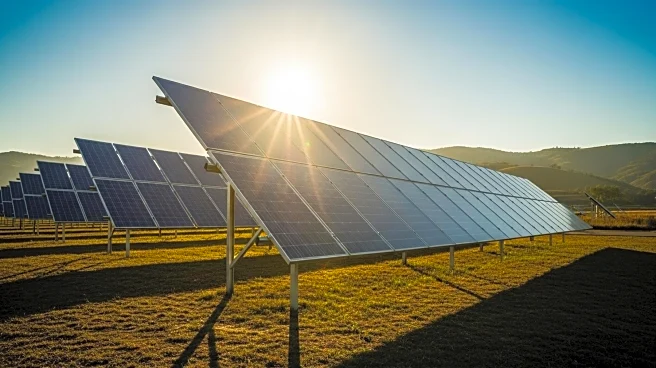What's Happening?
The African Development Bank (AfDB) is actively involved in promoting solar energy projects across Africa, as highlighted by the KHI Solar One project in South Africa's Northern Cape province. This solar thermal plant generates 50 megawatts of electricity, enough to power over 40,000 households. The project is part of a broader effort to integrate renewable energy into Africa's power grid, which is currently heavily reliant on coal. The continent faces significant electricity shortages, with about 600 million people lacking access to electricity. The AfDB's initiatives aim to address these shortages and support sustainable development. Despite Africa's vast solar potential, the continent has only 1.5% of the world's installed renewable power capacity. African leaders have committed to increasing renewable energy capacity to 300 gigawatts by 2030, with a focus on solar, wind, and hydropower.
Why It's Important?
The AfDB's support for solar energy projects is crucial for addressing Africa's electricity shortages, which hinder economic growth, education, and healthcare access. By increasing renewable energy capacity, Africa can reduce its reliance on coal and mitigate the impacts of climate change. The continent's vast solar resources present a significant opportunity for clean energy development, yet Africa receives only 2% of global clean energy investments. Expanding renewable energy infrastructure could transform the continent's energy landscape, providing reliable power to millions and fostering sustainable economic development. The AfDB's involvement underscores the importance of international support and investment in Africa's renewable energy sector.
What's Next?
African leaders and international stakeholders are expected to continue discussions on expanding renewable energy capacity at upcoming climate summits. The AfDB and other organizations will likely focus on increasing investments in solar and other renewable energy projects. As solar panel imports from China rise, independent energy companies may explore new opportunities in Africa's growing solar market. The success of these initiatives will depend on continued commitment from African governments and international partners to overcome financial and infrastructural challenges.
Beyond the Headlines
The push for renewable energy in Africa also raises ethical and cultural considerations, such as ensuring equitable access to electricity and respecting local communities' needs and traditions. The transition to renewable energy could lead to significant shifts in employment and economic structures, requiring careful management to avoid social disruptions. Additionally, the development of solar projects must consider environmental impacts and land use to ensure sustainable growth.









